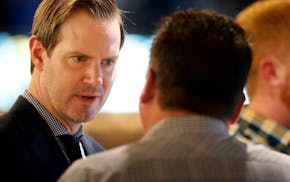Calvin Griffith gained permission from the American League to move his Washington Senators to the Bloomington prairie in October 1960. We had a great old time at Met Stadium in those earliest summers, with slugger Harmon Killebrew as the hero among heroes.
The Killer would hit more than 40 home runs in his first four Minnesota seasons, and lead the league with 48, 45 and 49 in 1962-64. He hit those 45 in 1963 despite missing the first 20 games after knee surgery.
And yet it was 1965, a season in which Harmon would miss several weeks after the All-Star break because of a dislocated elbow, when our pride in the Killer and in our major league status reached its zenith.
There would be a World Series, but before that there would be an All-Star Game in Minnesota. The date was July 13, which meant the corn in the fields visible from the Met's second deck would be knee-high and rustling in the summer breeze.
Talk about a reason to celebrate -- the greatest players in the greatest game were going to gather in our favorite erector set.
We were big league.
Officially.
And to make it more fantastic, the '65 Twins, after hints of strength in earlier seasons, sprung from the gate, moved into first place in the 10-team American League on Memorial Day weekend and started opening a gap.
The dreaded Yankees, AL champions in five consecutive seasons and 14 of the previous 16, were at the Met for a four-game series that preceded the All-Star Game. They arrived trailing the Twins by 12 1/2 games, and still we could not believe the Yankees truly were dead.
Not until Sunday -- when Killebrew hit a two-run home run on a 3-2 pitch with two outs in the ninth for a 6-5 victory. Ray Scott's call of that at-bat, and that blast, lives in Twins lore. Harmon's homer gave the Twins three of four in the series, a five-game lead over Cleveland and Baltimore and a 14 1/2-game separation from the Yankees.
The Killer's homer had us ready to burst with excitement, and then two days later, the All-Stars were here, and the burst was with pride.
The National League brought the greatest assembly of talent on one team in baseball history. There were 11 future Hall of Famers, and that doesn't count Pete Rose, the all-time hit king.
Juan Marichal, Sandy Koufax, Bob Gibson and Don Drysdale took care of 19 of the required 27 outs for the National League. Roberto Clemente, Frank Robinson and Billy Williams were the NL's backup outfielders to Willie Mays, Henry Aaron and Willie Stargell.
The NL ripped starter Milt Pappas and then one of our six Twins, Mudcat Grant, for five runs in the first two innings. The 46,706 ticket holders (including me) feared humiliation for our overmatched league on this humid afternoon.
It didn't count in the standings, but Minnesota needed Harmon -- to save face -- as much that afternoon as at any time.
The lead was 5-1 entering the last of the fifth and Cincinnati's Jim Maloney was on to join the future Hall of Famers in throwing bullets. But Detroit's Dick McAuliffe hit a two-run homer, and then Harmon came up with Brooks Robinson on base, and hit a two-runner to make it 5-5.
The Killer circled the bases inside one of the great dins ever heard at a ballgame in Bloomington.
The NLers eventually won 6-5, but Harmon had made the day for us, and he would later say: "That was really a big thrill, hitting it before the hometown fans."
Such a thrill, in fact, that when sculptor Bill Mack contacted Killebrew about the bronze statue that would sit on Target Field's plaza, and asked for a photo, Harmon said he had just the one.
And he sent along the newspaper photo of him getting full extension on the swing that sent the Maloney pitch into the Met's bleachers and tied the 1965 All-Star Game at 5-5. It was that swing, that big, uppercut finish, that Harmon -- early in his 70s -- tried to duplicate during studio sessions with Mack.
Harmon has gone, hopefully to a Field of Dreams, but if you're too young to remember that All-Star home run, don't fret it. You can see the Killer take that swing 365 days a year, in downtown Minneapolis, in bronze.
Patrick Reusse can be heard noon-4 weekdays on 1500ESPN. • preusse@startribune.com

Reusse: Paddack, Twins find some redemption against woeful White Sox

Reusse's Tortured Columnist Department update: Yes, Vikings won the offseason

Reusse: Wolves need stopper for Booker? NAW, it's not a problem.

Reusse: Success on court helped Timberwolves do strong business

